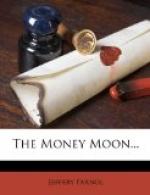“Why then, does he come every day, at the same hour?”
“Every day!” nodded Miss Priscilla, “it has become a matter of habit with him.”
“Ah?” said Bellew, smiling.
“If you were to ask me why he comes, I should answer that I fancy it is to—look at the peaches. Dear me, Mr. Bellew! what a very foolish old soldier he is, to be sure!” Saying which, pretty, bright-eyed Miss Priscilla, laughed again, folded up her work, settled it in the basket with a deft little pat, and, rising, took a small, crutch stick from where it had lain concealed, and then, Bellew saw that she was lame.
“Oh yes,—I’m a cripple, you see,” she nodded,—“Oh very, very lame! my ankle, you know. That is why I came here, the big world didn’t want a poor, lame, old woman,—that is why Miss Anthea made me her Aunt, God bless her! No thank you,—I can carry my basket. So you see,—he—has lost an arm,—his right one, and I—am lame in my foot. Perhaps that is why—Heigho! how beautifully the black birds are singing this morning, to be sure!”
CHAPTER IX
In which may be found some description of Arcadia, and gooseberries
Anthea, leaning on her rake in a shady corner of the five-acre field, turned to watch Bellew who, stripped to his shirt-sleeves, bare of neck, and arm, and pitch-fork in hand, was busy tossing up great mounds of sweet-smelling hay to Adam who stood upon a waggon to receive it, with Small Porges perched up beside him.
A week had elapsed since Bellew had found his way to Dapplemere, a week which had only served to strengthen the bonds of affection between him and his “nephew,” and to win over sharp-eyed, shrewd little Miss Priscilla to the extent of declaring him to be: “First a gentleman, Anthea, my dear, and Secondly,—what is much rarer, now-a-days,—a true man!” A week! and already he was hail-fellow-well-met with everyone about the place, for who was proof against his unaffected gaiety, his simple, easy, good-fellowship? So he laughed, and joked as he swung his pitch-fork, (awkwardly enough, to be sure), and received all hints, and directions as to its use, in the kindly spirit they were tendered. And Anthea, watching him from her shady corner, sighed once or twice, and catching herself, so doing, stamped her foot at herself, and pulled her sunbonnet closer about her face.
“No, Adam,” he was saying, “depend upon it, there is nothing like exercise, and, of all exercise,—give me a pitch-fork.”
“Why, as to that, Mr. Belloo, sir,” Adam retorted, “I say—so be it, so long as I ain’t near the wrong end of it, for the way you do ’ave of flourishin’ an’ a whirlin’ that theer fork, is fair as-tonishin’, I do declare it be.”
“Why you see, Adam, there are some born with a leaning towards pitch-forks, as there are others born to the pen, and the—er—palette, and things, but for me, Adam, the pitch-fork, every time!” said Bellew, mopping his brow.




